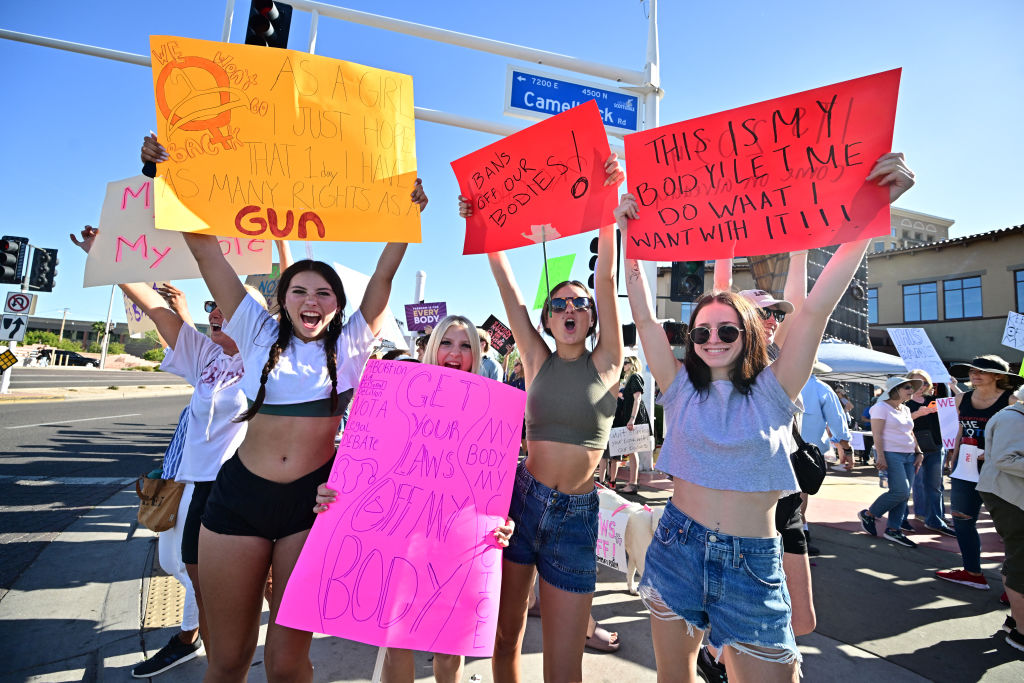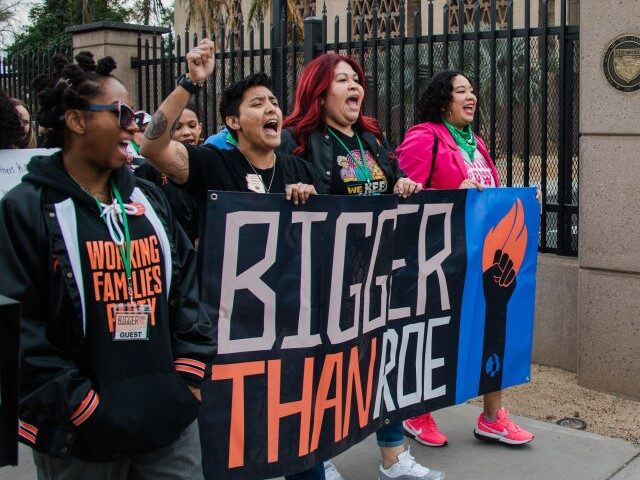When the U.S. Supreme Court overruled Roe v. Wade two years ago, the justices put the issue of abortion back on the ballot in all 50 states.
How would things turn out? How would the citizens of each state vote? The differences have been quite stark – from Mississippi’s near-total ban, to the state of Oregon where there are no restrictions at all on abortion based on duration of the pregnancy.
And then came the news this past week from Arizona, which approved a major ballot initiative calling for a Constitutional right to an abortion in the state up to 24 weeks — 9 weeks further along than the current 15 weeks currently permitted under Arizona law.

Pro-abortion rights demonstrators rally in Scottsdale, Arizona on April 15, 2024. (Frederic J. Brown/AFP via Getty Images)
What was going on in the Grand Canyon State? Before we examine what happened there and why, it’s worth reviewing where the American people stand on the issue.
The headlines from Gallup’s 2022 polling on abortion noted that a record-high 69% of Americans support the right, but there was much less press coverage – and much more interesting polling data – on where Americans stood on limits to abortion, especially those after the 1st trimester.
There was a reason why: it turns out that after 14 weeks of pregnancy, support for abortion rights plunged to a mere 34%. And by 24 weeks, the support fell off a cliff.
“Americans are about twice as likely to say abortion should be illegal than legal,” Gallup reported in their 2022 summary about abortions that far along in a pregnancy – and to little fanfare.
As for abortion extremists, Gallup reported that there are more of the pro-choice variety than pro-life: 19% believe abortion should be legal in all cases, while a mere 8% believe abortion should be illegal in all cases. This fact, too, got no media play.
Europeans, by the way, have come to the same conclusions about abortion. Protecting the right – but with limits. Italy and Spain up to 12 weeks, France and Germany up to 15 weeks.
Which leads us to the recent ballot initiative in Arizona this past week, calling for a Constitutional right to abortions up to 24 weeks, well beyond the Gallup polling – and far beyond even European law.

Jenny Kay, left, passes out free emergency contraception during Vote for Abortion’s Arizona Freedom Festival at the Arizona State Capitol on Saturday, June 8, 2024 in Phoenix, Arizona. (Rebecca Noble for The Washington Post via Getty Images)
Was there that much dissatisfaction with the current law in the state, which stands at 15 weeks – and was signed into law only two years ago and includes exceptions? Why did Arizona manage to gather 577,971 signatures, a record in the state, for this ballot initiative? One headline which appeared on Time.com just hours after Arizona’s secretary of state certified the initiative said it all: “How Arizona’s Abortion Ballot Measure Could Affect the Presidential Race.”
The headline couldn’t have been more clear: Arizona’s ballot initiative is not about protecting a woman’s right to abortion as much as it was about protecting the nation from another four years of a Donald Trump presidency. And if it meant scaring voters into believing that abortion protections were under threat in their state, so be it.
Indeed, the name of the group behind the initiative itself tells the story: “Arizona for Abortion Access.” And the name of the ballot initiative too: the Arizona Abortion Access Act. Those names imply that access to abortions in the state is somehow under threat by extremists – when there is nothing at all extreme about the 15-week limit. Indeed, the most recent Gallup polling confirms that the extremists here are the people running Arizona Abortion Access.
In a gushing account of the Arizona for Abortion Access effort, NPR ran a photo with a caption that indicated that more than 800,000 signatures were gathered – 823,685 to be precise. We learn in the same reporting that the secretary of state confirmed 577,971 signatures – a hint that maybe the people pushing the ballot were pushing extremely hard.
What can abortion moderates do about the 24-week limit on the ballot in Arizona? And what can Republicans do, knowing this effort was less about abortion than about the prospect of a second Trump term? It will take a concentrated effort to reveal the truth about the current Arizona state law — and about President Trump’s position on the subject, which is that the states can and should decide the issues for themselves.
Arizonans have proven to be sensible and sensitive when it comes to abortion access for women – and their current 15-week limit with exceptions is precisely where a solid majority of Americans currently stand on the issue.
It’s the 24-week crowd that’s extreme. And it’s the 24-week crowd that’s using the issue of abortion access not for the sake of the people of Arizona, but their own ambitions on the national stage.
That’s a story worth telling.

COMMENTS
Please let us know if you're having issues with commenting.